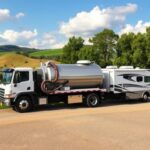Essential Care Tips for Your RV Septic Tank Service
Have you ever thought about what takes place to your RV’s Septic tank as you’re traveling? It’s not just dodging bad smells. Caring for your RV Septic tank in good shape helps secure hassle-free trips. A well-maintained system avoids messy incidents and costly expenses. Yet, many overlook this vital care. In this guide, we explain the necessity for regular pump for RV holding tank. We’ll highlight maintenance importance and provide tips for maintaining your recreational vehicle’s Septic tank. Prepare for trouble-free journeys!
Essential Points
- Scheduled RV Septic tank service is critical for peak performance.
- Understanding your RV Septic system assists sidestep costly repairs.
- Preventive maintenance stops unpleasant odors and clogs.
- Establish a pumping schedule matched with your usage.
- Use best practices for draining your holding tanks.
- Avoid common mistakes to lengthen the life of your Septic system.
- Understand when to call for professional help for Septic services.
How an RV Septic System Works
An RV Septic system is crucial for any camper. It contains multiple holding tanks that manage waste efficiently. You’ll find three critical tanks in an RV: the fresh water, the gray, and the black tank. The fresh water tank supplies clean water for drinking and cooking. Meanwhile, the gray tank stores wastewater from sinks and showers, maintaining cleanliness. The black tank, specifically for toilet waste, also has a vent to minimize odors.
Maintaining a healthy camper sewage system calls for knowing how these parts work together. Routine checks of the tank levels are essential to stop overflow and ensure everything runs without a hitch. Getting to know the termination valves is key too. These valves are key in effectively handling waste disposal. By understanding these components, you can keep your RV in great shape and relish your travels without any unnecessary trouble.
| Tank Type | Function | Typical Size |
|---|---|---|
| Fresh Water Tank | Supplies drinking and cooking water | 30-100 gallons |
| Gray Tank | Stores wastewater from sinks and showers | 30-60 gallons |
| Black Tank | Stores toilet waste | 30-50 gallons |
Why Routine RV Septic Tank Service Matters
Regular RV Septic tank service is central to keeping your system effective and long-lasting. Without timely maintenance, you could face system failures, foul odors, and pricey repairs—issues that interrupt your adventures.
Overlooking the upkeep of your RV’s Septic system may cause it to back up. This not only impacts your RV’s function but also your comfort levels. A clean and regularly cleaned system is vital for smooth trips, providing you a stress-free travel experience.

Scheduled maintenance prolongs your sewage system’s lifespan and keeps a clean living space. Monitoring your Septic tank lets you detect issues early. This proactiveness saves costs and stress, providing you confidence during your journeys.
How Often to Pump Your RV Septic Tank
Determining the best schedule for RV Septic tank maintenance is based on the vehicle’s usage. For those continuously on the road or staying in their RVs, it’s recommended to drain the black tank every three to five days. This practice maintains cleanliness and stops unexpected issues during voyages.
Weekend adventurers can generally wait until they return home to pump their Septic tank. Keeping waste in the tank too long, though, can cause build-up that hinders the tank’s function and smell control. It’s crucial to monitor the tank’s level closely, get ready for disposal once it hits around two-thirds full to keep everything running properly.
The capacity of your Septic system, along with how you use your RV, will dictate when to pump. Understanding these aspects improves your RV’s performance and cuts the dangers of poor waste management.
| Usage Type | Ideal Pumping Cadence | Urgent Pumping Indicators |
|---|---|---|
| Frequent Usage | Every 3-5 days | Tank is two-thirds full |
| Weekend Trips | After return home | Unpleasant odors or lazy draining |
| Extended Trips | Every 2-3 days | Gauge shows near full |
Smart Tips for Draining RV Holding Tanks
Properly managing a recreational vehicle’s holding tanks is crucial for a comfortable camping experience. Begin by draining the black tank first. This method enables the gray water to flow through and help rinse out the hose. Be sure the use of a high-quality sewer hose for a solid connection and to minimize spills. Once the tanks are emptied, fully flushing the black tank is important. Using a built-in black tank flush or comparable alternatives can greatly lessen residue.
After the emptying process, it’s essential to close both valves firmly. This action is necessary to maintain a fully operational Septic system. Additionally, RV owners must utilize dump stations properly and comply with local laws. Consistent cleaning practices for recreational vehicle Septic tanks are essential. They maintain the system’s optimal functionality and prevent future odors.
How to Stop RV Odors & Clogs
To tackle odors and avoid clogs in your RV, being meticulous is key. The task starts with making sure enough water in the holding tanks. Adequate water assists in breaking down waste efficiently, lowering bad smells.
Picking suitable toilet paper is important in this process. Opt for RV-safe toilet paper that dissolves quickly, preventing clogs. This small adjustment significantly supports maintaining seamless waste flow.
Applying enzyme-based treatments can further enhance waste decomposition and odor control. These bio solutions assist keep your RV smelling fresh. It’s also important to regularly inspect vent pipes for obstructions to ensure good airflow and stop odors from infiltrating your living area.
Errors to Dodge in RV Septic Maintenance
Looking after your RV’s Septic system correctly is crucial for its effectiveness and longevity. When non-biodegradable items like wipes or feminine products are flushed, they can cause major blockages. These blockages can result in various problems that are difficult to resolve.
Not using enough water when flushing can also damage the system. It causes waste buildup, resulting in nasty scents and potential damage. Furthermore, a common mistake at full hook-up sites is leaving the black tank valve open. This lets waste to accumulate at the tank’s bottom.
Preventive measures entail consistently flushing and rinsing tanks after emptying them. Skipping maintenance can snowball into significant issues requiring pricey repairs. Being proactive and knowledgeable helps both your RV and your finances.
Signs You Need Professional RV Septic Help
Recognizing when to seek professional RV Septic services is critical for keeping a healthy Septic system. Some clues point to the need for expert intervention. If you notice slow-draining tanks or smell persistent foul odors coming from your RV, it is wise to act promptly. These signs often indicate underlying issues that need a thorough Septic tank service for resolution.
Visible leftover waste after emptying can also reveal problems within your Septic system. This situation may not fix with routine maintenance and may call for the use of specialized equipment. Professionals are prepared to tackle complex challenges via tools, such as high-pressure water jets, to deliver a thorough cleaning process.
Timely professional assistance can make a major difference. Small problems can rapidly grow into more severe complications without proper care. Investing in professional RV Septic services protects the integrity of your system and extends its lifespan.
| Warning Signs | What to Do |
|---|---|
| Slow draining tanks | Contact professional RV Septic services for assessment |
| Persistent foul odors | Schedule Septic tank service for diagnostics |
| Visible leftover waste | Seek immediate assistance from a professional |
| Frequent clogs | Consider expert cleaning solutions |
Long-Term Care for Your RV Septic System
Long-term care for RV Septic systems demands attention past basic pump-outs. Performing deep cleaning of tanks every few months prevents buildup and lengthens system life. Checking dump valve seals on schedule prevents leaks. Additionally, sanitizing the system keeps it clean and functioning well.
It’s important to monitor tank sensors to confirm they work correctly. Incorrect readings may result in over-filling, hurting performance. Routine sensor checks and tweaking maintenance schedules can ward off this problem.
| Action | Frequency | Benefits |
|---|---|---|
| Deep Cleaning Tanks | Every 3-6 months | Stops residue accumulation |
| Inspect Dump Valve Seals | Monthly | Maintains seal integrity |
| Sanitize System | Every 6 months | Controls bacteria |
| Monitor Tank Sensors | Monthly | Guards against overflow |
Preventive maintenance is central to your RV Septic system’s long-term health. It sets up enjoyable and seamless travel experiences.
Why Choose All In Sanitation for RV Septic Needs
All In Sanitation excels at providing RV Septic services that meet each client’s unique needs. Whether it’s scheduled pump-outs or comprehensive tank cleaning, they grasp the essential role of a well-functioning Septic system in your RV’s performance.
Boasting extensive expertise in RV Septic systems, All In Sanitation offers top-tier guidance on maintenance and care. Their team is knowledgeable in the specific challenges RV owners meet and offers effective solutions when troubles arise.
Selecting All In Sanitation lets RV enthusiasts fully engage in their journeys, handing over Septic concerns to a reliable ally. Their dedication to excellent service brings tranquility and improves the pleasure of adventures on the open road.
In Summary
Caring for your RV Septic tank is vital for hassle-free travels. It’s crucial to grasp your system and adhere to regular services. This ensures you won’t face unexpected issues on your journey. These key steps cover frequent pumping and using sound waste management practices.
Proper long-term care maintains your system in top shape. By using the provided maintenance tips, you can improve your travel experience. This approach guards against expensive repairs later. Bear in mind, sidestepping common errors and knowing when to obtain professional help are important.
Ultimately, being prepared in your RV Septic system’s maintenance secures a hassle-free adventure. It enables you to concentrate on forming lasting memories. So, apply these steps to heart and enjoy your road trips to their fullest.


